- Home
- A. S. King
The Dust of 100 Dogs Page 3
The Dust of 100 Dogs Read online
Page 3
“Maybe you should have let me decide for myself.”
“Don’t be smart with me.”
“Don’t be smart with your mother, Saffron.”
“I’m just saying that maybe if you’d gone easier on me, maybe put on less pressure …” I felt bad for making it sound like her fault, and yet wanted to scalp her right there in her own kitchen, with her own blade.
“Well, you haven’t decided anything yet. And I promise you one thing. You will succeed and that’s final! You will go to college and that’s final! I don’t care about what you think! You live in my house and you will do as I say!” she yelled.
My father looked to her. “Is she the same age as Patricia was, when—”
She nodded.
“Oh,” he answered, looking away.
“I know what you’re talking about. You don’t know enough to start diagnosing me here at the kitchen table. What do you know about any of that, anyway?”
“Don’t put down your father.”
“I’m not. It’s true.”
“Just go to your room and study!” my mother yelled. “Don’t come down until tomorrow. We have enough to think about without you going mad as well.”
I walked into the hall and closed the kitchen door. The minute I was alone, I regretted saying anything. But it seemed my guidance counselor (who I was now dismembering, phalange-by-phalange) already had the ball rolling. Maybe it was a good thing that I told them then. I was halfway through my junior year and in sixteen months, I would be eighteen. Free to go and pursue my old business, my old life, and get out of their house.
My father’s assumption that I was acting on hormones incensed me, and made me feel a familiar trapped-with-the-ignorant feeling I’d felt my whole life. It seemed that the more I matured as a human, the more I wished to be back in a coat of canine fur. What was this but a fight for dominance? The baring of teeth and the protection of perceived property?
That night, when Junior came in, my father used so many obscenities that I thought my mother would secretly pray for weeks to get him forgiven. After a half hour of screaming and a search, they found two more bags of pot, a small vial of something white, and a tiny Ziploc bag of speed. My father dragged Junior to the bathroom and made him watch as he flushed it all down the toilet.
The next morning, Junior didn’t bug me at the bathroom door like he usually did, and he didn’t tell me I looked as skinny as a concentration camp victim like he usually did, and he didn’t even look at me over breakfast. My father slept late and my mother said nothing all morning. Before I closed the door behind me on my way to the bus stop, she tapped me on the arm and handed me an ivory envelope. I shoved it into my backpack and forgot about it.
Once I got to my locker and was organizing my books for the day, I finally opened and read it. It was short, and in my brother’s handwriting.
There was the name and address of a local psychologist scrawled at the bottom. No wonder Junior had left me alone all morning. He was gloating. She’d had him write it to shame me, probably. A drug-addict loser having to write his smart little sister a letter about how she should get her shit together was exactly how my mother communicated.
I closed my locker door and spent the rest of the day nervous about the appointment. I had lived a lifetime of half lies and dodgy explanations, but I doubted I could fool a professional no matter how hard I tried.
What struck me that day, as I sat through preoccupied class after preoccupied class, was the pure irony of it all. There I was, the rightful owner of what would amount to millions of dollars, and my parents were mentally withering away because of money worries. They wanted me to pursue a life as a doctor so much that they took a loan out to send me to a shrink, when, in fact, I could already help them if they would only let me.
Sitting just off the riverbank, bundled in every piece of clothing she owned, Emer Morrisey counted her money. She had two French coins, both nearly worthless—she could never afford a voyage back to Ireland. Although unsure what might await her there, she was certain it had to be better than begging the wintry streets of Paris. Ireland was home, no matter who ruled it now.
For eight years, before she was sent to Paris, Emer lived in the dismal rocky hills of Connacht—one hundred miles from her village—and never once thought there could be a worse place. But living rough in Paris had turned what she once felt was hell onto its back, wanting its belly scratched.
“Anything is better than being the bought wife of an old man,” she often told herself, but she often doubted herself too. It was 1659, and Emer was fifteen. After a long, cold year in France, she was unsure of nearly everything.
Her mother was the only one who made sure she didn’t jump into the river and drown herself. On so many occasions since she had arrived in Paris, her mother had talked sense into her half-frozen ears, keeping her alive.
You can’t depend on men, Emer, your whole life. Sometimes you have to depend on yourself.
Of course, her mother was dead now. Everyone was dead now. Ireland was dead, the king of England was dead, the dragon was dead, and as far as Emer was concerned she was dead, too, even though her mother wouldn’t let her jump from the riverbank to make it official.
“Damn it anyway,” she mumbled as she looked at her two worthless coins and buried them in a hidden pocket beneath her skirt. She got up, and began the walk to the small grotto that she’d lived in since running from the docks her first day in Paris.
“There’s got to be something better than this,” she said to herself, shivering.
Emer was considering another way out. Earlier that day, she’d heard from another Irish-speaking woman, a nun who fed beggars and nursed invalids, that a boat would soon leave for the islands. She’d said young women were traveling there to settle a bustling republic called Tortuga. It was already packed full of hard-working men, and the nun made it sound like Tortuga was a sort of husband market, where a woman would be able to choose a man she liked. To Emer, the nun’s story sounded like a horrible trap for whoever was stupid or desperate enough to believe it. Yet she was feeling more stupid and desperate by the day.
Arriving at her small pile of rags and straw inside the grotto, Emer rearranged her layers of clothing and propped her bony body between two rocks to sleep. In her right hand, she grasped a small wide blade in case of unwanted visitors. In her left hand, she held a tiny carved crucifix in case of unwanted memories. She cried herself to sleep—as she had every night—imagining the long, stretching view of the patchwork valley that had once been her home.
“Emer!” her mother called. “Get down from there and find your brother! It’s time to eat.”
She often sat atop the tower of a small abandoned castle, looking in all directions. She pretended she was the soldier on watch, anticipating the attack of a rival clan or the dreaded English. Whenever she and her brother played war, he could barely contain himself when she chose the role of king.
“Emer, you can’t be a king,” he would taunt. “You’re a girl. Girls don’t become kings—or anything important.”
“Shut up. We’re only pretending, anyway.”
“But if you’re king, then what am I?”
“You can be king too,” she would say. “We can both be kings.”
“Can’t you be a queen? Queens have just as much power. Why don’t you be the queen?”
“Queens don’t fight. Kings fight. I want to fight. Come on, Padraig, let’s just play.”
“Okay, but I get to be King of Munster and you can be king of anywhere else.”
Padraig always won their make-believe battles. He was older, bigger, and stronger. He didn’t know to let Emer win sometimes, but she didn’t mind because she never wanted to pretend-win anything.
“Emer!” her mother cried again. “It’s time to eat!” When she lost patience, her Gaelic w
as as harsh as a winter gale.
Emer raced down the spiraling stone steps, careful not to spoil her dirt drawings from previous days, and found her way to the wash bucket outside their small cottage next door. She wiped her wet hands on her wool skirt and appeared at the small oak table next to the fireplace.
“What were you doing up there all day?” her mother asked, half smiling and half frustrated.
“Oh, you know, the usual stuff.”
“Did you see anything today?” Padraig asked, smirking.
“I saw the last two swallows fly south,” she remarked. “And I saw Mr. Mullaly and Mrs. Mullaly in the field.”
Her mother looked up from her cast-iron griddle. “The Mullalys?”
“Yep.”
“What were they doing in the field?”
“Building something, I think. And hugging and kissing.”
Padraig burst into laughter.
“Emer, you’re not to spy on people from up there,” her mother scolded. “That’s none of your business. Besides, the Mullalys are our friends and neighbors. Why can’t you do something more productive with your time?”
“What else is there to do? I can’t go with Padraig and Daddy to the field. I can’t come with you because I get in the way. I like it up there. What if someone comes to take the valley? I’ll see them first. I’ll sound the alarm! I could save the whole lot of us!”
Her family looked at her, amazed at her fantasies. Often her mother would complain to her father about what was said within the child’s earshot. At five years old, she understood things only adults should know, like the risks of living in free Ireland and how civil wars abroad might make them a target. She’d learned this and other things from a conversation between her father and her stern Uncle Martin a month earlier, and since then spent most of her time in the lookout, just in case.
“Tomorrow you’ll come with me,” her mother decided. “We’ll go see Mary and then we’ll sort out some new shoes for you and your brother. Winter will come quickly this year.”
“Won’t I be in the way? You always say I’m in the way!” The last time Emer went with her mother to Mary’s forge, she handled an unfinished short sword and cut her palm on the ragged blade.
“Just behave yourself. We won’t be long at Miss Mary’s, and if you just behave yourself you won’t be in my way at all.”
Emer began to panic. “But who will watch the valley?”
“I will,” Padraig said, quite seriously.
“But what about Daddy? Doesn’t he need you in the field?”
“He’ll let me take your job for the day. Don’t worry.”
She looked at her mother to make sure he wasn’t lying. “Is that okay?”
“Of course it is. Your brother has eyes just as good as yours.”
She looked at him suspiciously. “You’re sure?”
“Positive. I’ll watch all day. I promise.”
That night, after Emer had cuddled into bed with her warmer older brother, her parents spoke of the next day’s projects.
The Mullalys were in charge of distributing weapons to various small outposts along the route through their territory, and Emer’s parents were responsible for organizing those weapons. So far, they had hidden over a hundred different pieces in four different locations. Miss Mary had forged over thirty of them, pike heads mostly, but a few sturdy swords as well.
After a breakfast of porridge and a hen’s egg, Emer and her mother walked a mile on the old forest path to Mary’s forge. A small thatched cottage of two rooms greeted them, Mary hard at work above the bellows and sweating, her forearms as big as any man’s after years of pounding shapes from lumps of metal.
“Emer!” she exclaimed. “How nice to see you, pet!” She stopped working and moved all sharp objects to the side.
“Hello, Miss Mary.”
“Your mother tells me you’ve been busy in the tower watching the swallows all summer.”
“They had five nests,” Emer answered. “And three broods of babies this year.”
“Three?”
“Yep. It was a long summer.”
“A fine long summer!” Mary said, offering Emer a small cup of brewed tea. She turned to Emer’s mother. “And how is Mairead today?”
“Fine,” Mairead answered, removing a sack from her back that was heavy with metal for Mary and a rolled piece of bullock hide for the cobbler.
Mary’s house was suddenly too hot, and Emer took off her cape.
“Don’t get too comfortable. We’re on our way in a few minutes. Why don’t you go outside and play while I finish some business with Mary?”
“But—”
“Just go outside and play and I’ll be out in a minute.”
Every time Emer played while her mother did business with Mary, she ended up with stings, bites, or bleeding pricks all over her body. She left the house and stood quietly outside the front door, in the only area that was clear of thorns or stingers, until a mix of boredom and curiosity overwhelmed her.
Slowly, she made her way round the chimney side of the house, creeping ever so closely to the thick limestone walls. By the time she reached the back window and could look in, she’d missed seeing what wares her mother had stuffed back into the large sack. She only saw a few lumps of bog iron and a pile of worn horseshoes, lying on Mary’s table next to some coins. In straining to see just how much money Mary had, Emer leaned directly into a large, vigorous nettle growing out of the wall and stung her forehead.
By the time she managed to inch all the way around the house again, sniveling and groaning, her forehead was swollen, bumpy, and red, and she was wailing.
“Did you meet a nettle again?” Mary asked, laughing a little.
Emer just nodded, crying in her mother’s lap. Mary walked to the front door and ripped a weed from the path, ground it into a sappy green paste between her rough hands, and returned to smear it on Emer’s wound. Emer flinched at first, but knew that if she allowed Mary to do her magic, the sting would disappear soon after. Her mother could do the same sort of trick with nettle stings.
Walking to the brog maker, Mairead thought quietly to herself and hummed a tune. Emer ran ahead and looked into fox tunnels in search of telltale fur, always returning to report what she’d found—not knowing how silly she looked with her sappy green forehead.
“Not a single hair in that one,” she said. “That means that they don’t live in there anymore.”
“Mind yourself, Emer. Don’t get too hot or your head will start to hurt again.”
“It’s fine, Mammy. I can’t feel it at all anymore.”
They continued down the small dirt lane and over the Carabine Bridge, a land bridge that acted as a trap for intruders. Emer took off down the nearby riverbank and touched the flowing water to her hand. She splashed some onto her face and washed off the paste that had dried there.
“Don’t get wet now. We have a ways to go,” Mairead yelled. “And don’t wash that paste off.”
“But it feels so nice.”
“Emer, just do as I say.”
She returned to her mother’s side, smiling, and Mairead reached down to hold her hand.
That evening, after the cobbler had been visited and the dinner had been eaten, after her brother and father went to visit a friend, Emer sat down with her mother and pulled her needlework from a small sack. Ever since she could remember, her mother had taught her to embroider and sew. Even when they had so little money that they unraveled old bits of twill for thread, they sat and sewed for at least one hour every night. At her young age, Emer was very handy with a needle and could make simple designs on bits of scrap wool. Since she’d turned five, her favorite design was a Celtic cross, rounded at the top and wide at the bottom. She had begged every evening, the whole summer, for permission to
embroider a big one on her own cape, but Mairead wouldn’t allow it. That night was no different.
“Don’t you want to improve your stitching before you try something so important?”
“No. I want to put one on my cape. It would be brilliant, wouldn’t it? The other girls would be so envious.”
Mairead imagined the gossip. “We just don’t have the money for that much thread. You’ll have to wait.”
“But you gave Miss Mary a handful of coins today! Why couldn’t you save some for me?” She began to cry, and her voice reached a high-pitched screech on the “me.”
“You shouldn’t be spying, Emer. I’ve told you that a thousand times.”
“You’re giving all our money to Miss Mary and you don’t care about me!”
“That’s not so. That money wasn’t all ours, and Mary is a very important lady, making us these things. You should be less selfish, girl, and listen to me more often. Stop spying and sneaking around things you don’t understand.”
“But I want to make a pretty cape!” Emer screamed, losing all control. “Why don’t you love me anymore?”
Mairead gathered all the sewing things and returned them to the sack. Emer tried twice to stop her, but had her hand slapped smartly. She rose with a yelp and raced out the door, up her stone stairway to the lookout. Upon her arrival, she found that none of her dirt drawings had been disturbed, and realized that her brother hadn’t been there that day like he’d said he would be. She screamed again, and cried as hard as she could. People in the dusk-lit valley below shook their heads and pursed their lips with disappointment. Her father and brother heard her, too, a half mile away, and pretended they didn’t as they continued to talk important business with their neighbors.

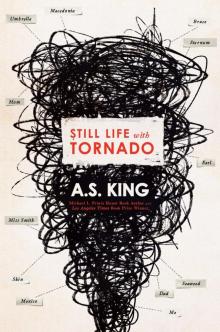 Still Life With Tornado
Still Life With Tornado Ask the Passengers
Ask the Passengers Glory O'Brien's History of the Future
Glory O'Brien's History of the Future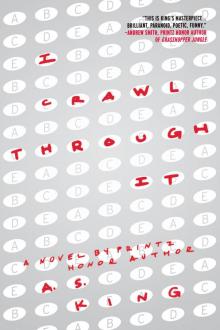 I Crawl Through It
I Crawl Through It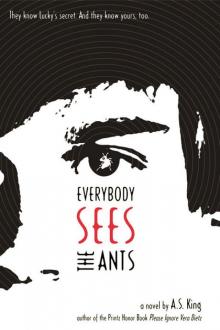 Everybody Sees the Ants
Everybody Sees the Ants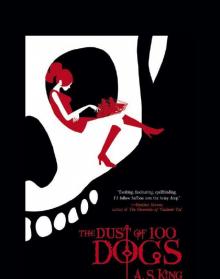 The Dust of 100 Dogs
The Dust of 100 Dogs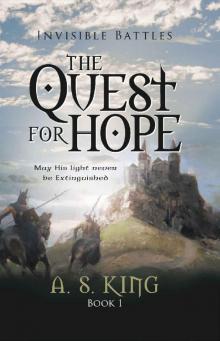 The Quest for Hope | Christian Fantasy Adventure (Invisible Battles Book 1)
The Quest for Hope | Christian Fantasy Adventure (Invisible Battles Book 1)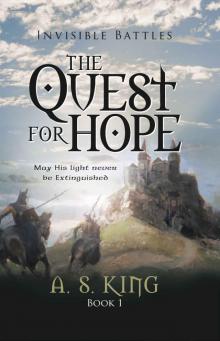 The Quest for Hope | Christian Fantasy Adventure
The Quest for Hope | Christian Fantasy Adventure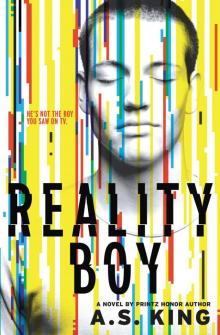 Reality Boy
Reality Boy Please Ignore Vera Dietz
Please Ignore Vera Dietz